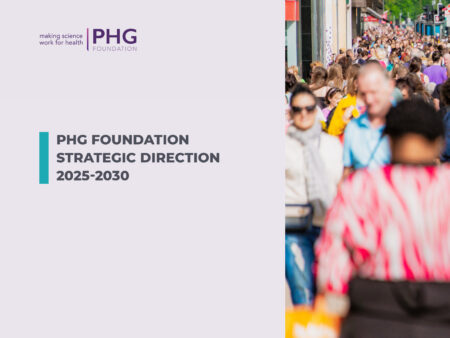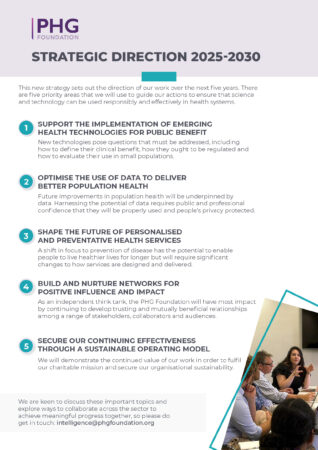It is now nearly a quarter of a century since the Human Genome Project concluded in celebration at biology’s arrival as Big Science and optimism about its revolutionary implications for healthcare. It is nearly twenty years since Sir David Cooksey evoked the ‘valley of death’ to explain how turning scientific discovery into biomedical innovation was not a freewheel downhill. It is fifteen since UK life science strategies set out to bend biomedical research and the UK’s national health services together. Since then we have seen the 100,000 genomes project and the Genomic Medicine Service established in England to advance molecular science and diagnostic results. By 2035, it is claimed, genomics will feature in half of all healthcare episodes.
Over this time, however, the gap between what we have discovered about the biological factors contributing to health and disease and the general health of our population has, if anything, grown. This is not because health services have failed to introduce innovative science and technology. But they have not been able to do so systematically, at scale, and across populations and geographies. And the many acknowledged successes have been confounded by stubborn, structural and all-too familiar public health challenges, workforce limitations and infrastructural obsolescence. So far innovation has not resulted in a fundamental shift.
Shifts are now the rubrics for national health policy. Within just the last year we have had the Sudlow review recognise the critical nature of national data infrastructure and the imperative of data integration; we have had the Darzi report define the potential to use digital technology to tip healthcare out of hospitals and into communities; we have had the Sinker review recommend a package of synergistic reforms to boost the NHS’s innovation ecosystem; and we have seen the Government’s own endorsement of shifts towards digital, community and prevention that will frame a new 10-year plan for the NHS in England.
What is needed now is better not just more innovation. The last decade’s emphasis on ‘science push’, has often resulted in a kind of indigestion that has prevented the assimilation and diffusion of new knowledge, products and practices. While we may speak of innovation ecosystems, we often still think in terms of roadmaps and pipelines, of overcoming obstacles and blockages, rather than of governing forces and relations that are out of balance. This pattern is already repeating with digital technologies and AI.
From its beginnings, PHG identified the need for an interdisciplinary ‘enterprise’ to ‘make science work for health’. Our work aims to discover and define the norms that govern the needs, interests and values in play and orientate them towards the general good. What do we mean by norms in this case? The rules, policies, guidelines, standards, institutional structures and professional practices, conventions of culture and commonplaces of thought that govern relations between these different needs, interests and values.
We want to make science work for health but we also want science that works for health. If this seems like a tautology it is only because we ignore the fact that science is also a human activity, something that a concentration on discovery, investment and growth can often obscure. PHG’s focus on policy, governance and ethics restores three crucial questions to the centre of public decision making about biomedical science and technology: What innovations should we promote? How should we control them? How do we know that they are good?
Our new strategic orientation marks out three horizons where these questions materialise: the adoption of new health technologies, the processing of data that supports them, and the increasingly personalised models of care through which they will be encountered. It builds on our foundational work in genomics, but recognises that it is not in any one field of knowledge but in the complex convergence of diverse knowledges, practices, products and applications that the potential practical benefits lie. And it recognises that this complexity will be, and can only be, addressed with new digital tools that have exciting and challenging implications for current ways of knowing and acting.
PHG’s new strategic direction document describes the outcomes we want to see and what we believe we can contribute to realising them. It sets out how we expect to use our distinctive capabilities, including our subject expertise in both the sciences and humanities, and how we intend to organise our model and processes to support this. And it asserts our commitment to a set of guiding values, including the pursuit of scientific knowledge, respect for personal interests, cooperation and fair treatment, and an interdisciplinary and transdisciplinary approach – working across different sectors of academia, policy and health services – that has always been at the heart of our work. Guided by these, PHG aims to promote the conditions that will align policy, governance and ethics to support effective health systems in the 2030s and beyond.


